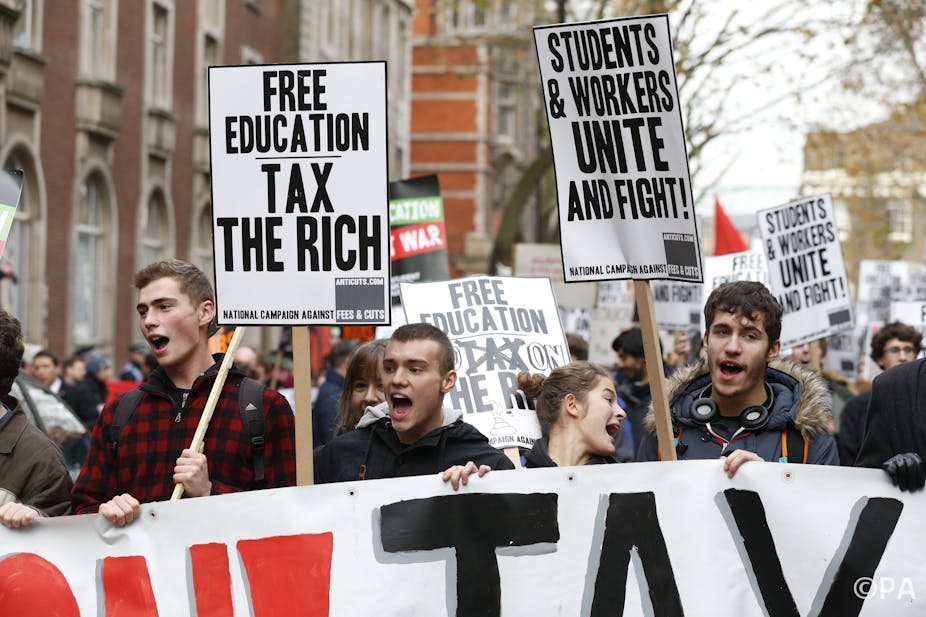It is now as close to a consensus as makes no difference that the current regime for funding higher education in England through high fees paid by students – or repaid by some graduates – is bust. Lord Browne’s assertion when he launched his 2010 review of the higher education system that his new “market” represented a paradigm shift was always bombastic. Shrill claims by the Coalition government and its former universities minister David Willetts that it was putting “students at the heart of the system” have now turned to ashes.
But there is no consensus about what should replace the current regime. The Conservatives dream of total privatisation with no cap on fees, and the expensive student loans book off-loaded by the state. Labour mumbles about reducing the cap to £6,000 but offers no guarantee it would provide the extra public expenditure needed to plug the gap. The Liberal Democrats keep their heads well down – and who can blame them after their U-turn on the promise to abolish fees entirely. There is little sign of politicians, of any party, riding to the rescue.
No going back?
The only thing that everyone in the mainstream political parties seems to agree on is that there can be no going back to “free” higher education as it existed for almost half a century until New Labour broke the taboo and introduced modest fees in the wake of the 1997 Dearing report.
Free education is now seen as a pipe-dream. Politicians agree that what fiscal room that might exist now or in the future, and is not needed to fund voter-friendly tax cuts, should be used to support the National Health Service and other deserving public services, not to subsidise the higher education of the pampered middle classes. They, of course, overlap with much praised “hard-working families” – it’s so confusing.
To avoid the inevitable conclusion that the only alternative to charging students or graduates for their higher education is to fund it through general taxation, people tie themselves in knots, devising ever more complicated schemes. Graduate taxes, tax-deductible fees, hypothecated taxes… At times it feels a little like medieval astronomers doing everything possible to avoid having to admit that the Earth revolves round the Sun, rather than the other way round, by coming up with ever more bizarre calculations.
NUS roadmap makes good sense
So the National Union of Students deserves to be congratulated for publishing its roadmap for “free” higher education. Once the possibility of a return to a tax-funded system is accepted, it seems to make such obvious good sense. As the NUS argues, it is a good deal for students and for the country. Students took to the streets on November 19 to campaign for a return to free education.
In England, students are now likely to graduate with more than £40,000 worth of debt. So, even before they start work, they are saddled with mini-mortgages. No one knows what the longer-term effects of such levels of debt will be on students from poorer backgrounds, although it is hardly likely to encourage them – however generous the bursaries on offer are. Nor is it certain what the impact will be on subject choice.
But we do know the new high fees regime is already having a significant effect on the behaviour of institutions through high-pressure “sales” pitches, guaranteed “success” and perhaps an over-investment in “signature” buildings and hotel-style student residences. Good teaching is getting shunted aside by a nervy preoccupation with the “student experience”.
Status quo unsustainable
We also know the new high fees regime is a spectacularly bad buy for taxpayers, as another new report by the expert Higher Education Commission has shown. Nearly half of the outlay on state-backed loans to pay the higher fees will never be recovered. Despite the claim by Willetts that this will only become an issue in the distant future, it is actually a burden in the here and now. Publicly generated resources from taxes and borrowing are being used to fund loans and so are not available to be spent elsewhere.
But the most decisive argument in favour of funding higher education out of general taxation is positive not negative. It is a first-rate investment. The Organisation for Economic Co-operation and Development has calculated that for every pound invested by the state in higher education, three additional pounds of national income are generated – a three-for-one offer that far exceeds even the most laundered rates-of-return claimed for big projects such as HS2.
Where the money could come from
But two rather than three cheers for the NUS roadmap. It makes all these killer points – but then flinches. “Free” higher education should be paid out of general taxation, hopefully on a more progressive basis – good. But this is to be achieved by taxing not “us” but someone else – not so good. The NUS floats all kinds of things – a financial transfer tax, increases in corporation and inheritance tax… with increases in income tax very much a last resort.
The problem is not that the rich shouldn’t pay more tax – of course they should. It is that in 21st-century England tax aversion is an unchallengeable fact. That has to be challenged – head-on and boldly.
Compared with many other European countries, especially Scandinavia, less of the cost of maintaining our public services is now paid for by direct taxation with more paid for by indirect taxes and borrowing. This shift, which began under Margaret Thatcher, was deliberate of course, to make it easier to bribe the electorate with “visible” tax cuts. The effect, also deliberate perhaps, has been to undermine the fiscal foundation of all public services – and to make it much more difficult to sustain “free” higher education.

